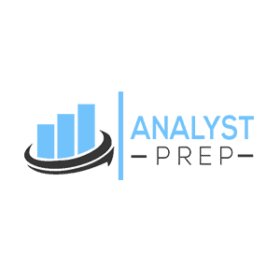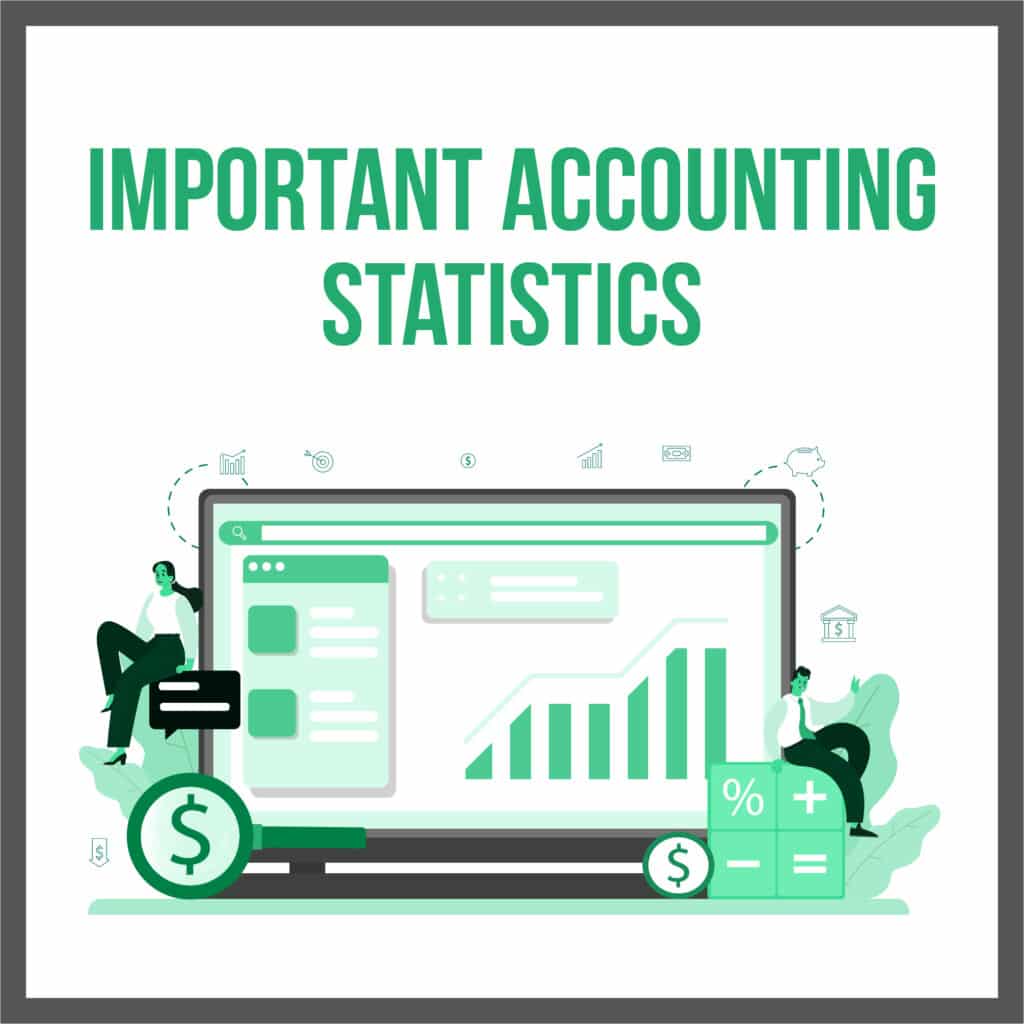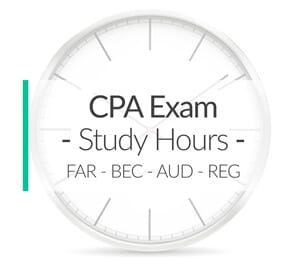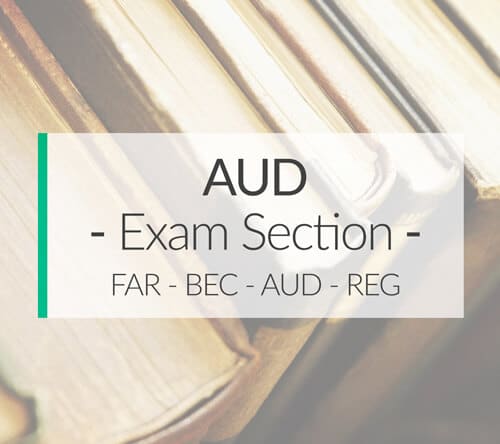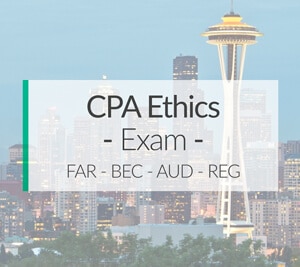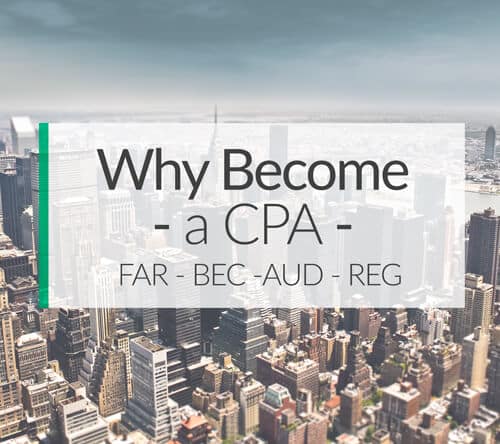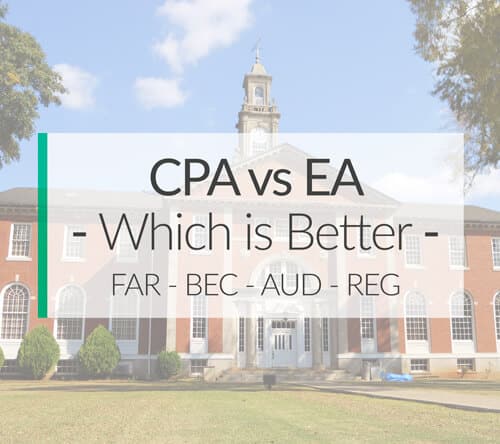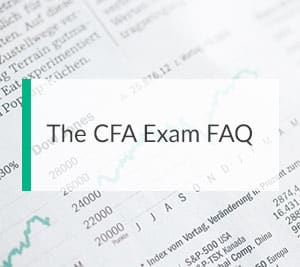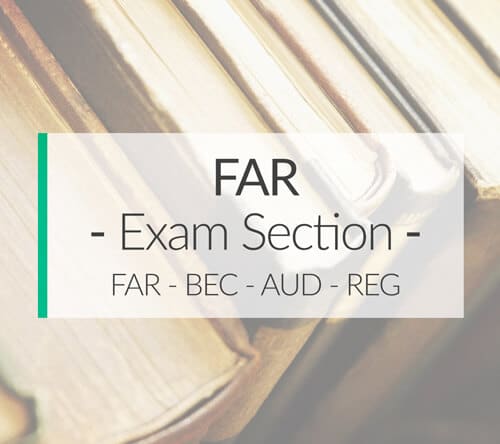Did you know that setting career goals can actually change your brain?
Scientific studies show that when we train our minds to think about what we want in life, we are much more likely to achieve it. In fact, one study by researcher Gail Matthews found that writing our goals, sharing them with friends, and sharing them publicly greatly increases one’s ability to achieve them.
If you’re ready to set new career goals in the accounting field, a CPA or CFA certification could be the perfect objective to add to your list.
But how do you choose which designation is right for you?
Making the right decision for you will be based on a number of factors, including what your interests and aptitudes are, how much money you want to make a year, and how much time you have to dedicate to studying and test-taking.
The first step to making the right choice for you is educating yourself on each option, what they require, and what each designation can do for you. Let’s take an in-depth look at CPA vs CFA.
CFA and CPA Differences
Although CFA and CPA might sound similar, they are vastly different. CPAs work in accountancy while working in Investment Management and Advisory. While CPAs typically handle duties such as filing tax returns and auditing reports, CFAs take a much more involved role with their clients.

Here’s one way to think about it: CPAs are the ones creating the financial documents, while CFAs are the ones analyzing them. As a CFA, you’ll be expected to make high-level financial analysis decisions as well as investment management.
Though both roles are important to their organizations, it’s safe to say that the prestige of the CFA designation demands closer attention to detail and a more robust job description.
What is a Certified Public Accountant (CPA)?

A Certified Public Accountant, or CPA, is a certified accounting professional with education, knowledge, and background in accounting services. The CPA certification distinguishes individuals as experts in their field.
It’s important to recognize that “CPA” isn’t a job or role but a designation. CPAs are responsible for a wide range of job duties, which can vary based on the client. They complete financial accounting for individual clients and businesses that need support to reach their financial goals.
Here are a few examples of the common job functions a CPA might take on:
- Preparing financial reports and financial statements
- Tax reporting and filing
- Establishing budgets
- Performing audit reports
The road to getting a CPA license is not an easy one. You’ll need to meet several rigorous requirements before earning the designation.
Let’s take a closer look.
CPA Qualifications
Since CPAs are renowned as experts in their field, it should come as no surprise that you’ll need to meet several qualifications before you can earn the certification.
Perhaps the most important thing you’ll need to be successful as a CPA is a genuine interest and aptitude for working with numbers. Since you’ll work closely with clients regarding their financial accounting, it’s also helpful to have keen communication skills.

While having soft skills can help you be successful as a CPA, there’s more to it than that. Let’s break down a few more basic requirements.
- Bachelor’s degree in business administration, finance, or accounting
- 150 hours of education
- 2+ years of professional accounting experience
- Pass the CPA exam
We’re not through yet: once you earn the CPA certification, you’ll also have to abide by strict continuing education requirements to maintain it.
Luckily, as you gain more experience by furthering your education, your salary potential grows, too. CPAs tend to climb the salary ladder in the finance industry year by year.
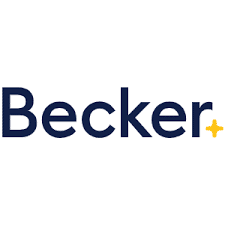
Extended Sale – Enjoy $1,331 Off Becker CPA Pro+

Extended Sale – Take $1,330 Off Becker CPA Pro

Enjoy $1,249 Off Gleim CPA Premium Pro Course

Extended Sale – Get $1,000 Off Becker CPA Concierge

Take $629 Off Surgent CPA Ultimate Pass

Becker CPA: Interest-Free Payment Plan – Deal

Becker Deal: Save on CPA Single Part Courses

Get CPA Evolution Ready Content on All Becker CPA Courses – Deal

Becker CPA Advantage Package Now $2,499 – Promo

Enjoy a 14-day Free Trial on Becker CPA Courses
What is Chartered Financial Analyst (CFA)?

A Chartered Financial Analyst, or CFA, is a prestigious professional designation awarded by the CFA Institute that marks competence in financial planning and investment management. The CFA is one of the most difficult designations to earn in the financial industry.
CFAs help clients make sound financial and investment decisions based on financial data. They work in banks, brokerage houses, investment firms, and universities. Some CFAs work for organizations, though many opt to be self-employed, which allows them to take on their own clients.
Let’s take a look at a few more job functions of a CFA:
- Creating and implementing financial planning tools
- Working with financial bankers on contracts and calls
- Preparing investment budgets

Before you can start your journey to becoming a CFA, there are a few things you’ll need to do first. Next, we’ll go into detail regarding the qualifications you’ll need to meet.
CFA Qualifications
The CFA designation is considered the gold standard in financial analysis. This prestige comes at a steep cost, though, especially in education and study.
If you’re good with numbers and have great verbal and written communication skills, becoming a CFA could be a great fit. You’ll also need strong decision-making and analytical skills to excel in the field.
Let’s dive a little deeper. Here are the education and experience requirements required to become a CFA:
- Bachelor’s degree in business administration, accounting, or finance
- 4 years of relevant professional working experience, with at least half making investment decisions
- Pass the CFA exam
- Become a member of the CFA organization and pay applicable fees
Once you officially hold a CFA designation, you’ll need to sign off annually indicating your adherence to the CFA Institute’s code of ethics and standards of professional conduct. Failure to do so is punishable by up to lifetime revocation of your designation.
CPA vs CFA Exam Differences
While both the CPA and CFA require you to pass an exam, the curriculum you’ll need to study is different. The structure of each exam as well as how you can take them, also differs.
The CPA exam is divided into four sections that, combined, make up 276 multiple-choice questions, 28 task-based simulations, and 3 writing portions. Each of the four sections is taken separately, and test takers can choose the order in which they are taken. Students have 18 months to complete all four sections.
The CFA exam, on the other hand, is broken up into 3 levels which must be taken sequentially. Before one can move on to the next section, one must earn a passing score in the previous one. CFA hopefuls also only have the opportunity to take the CFA exam once a year in June, with the exception of Level 1, which can also be taken in December.
If you fail Level I of the CFA exam, you can try again in 6 months. Failure of Level II or III, however, will require you to wait a full calendar year before re-attempting.
CPA Exam Topics
The Uniform CPA Examination is designed to protect the public interest by ensuring that individuals practicing CPA job functions are qualified to do so. That means you’ll need to undergo testing to prove your capacity to complete certain CPA-related duties.
CPA exams cover four major areas:
- Auditing and Attestation (AUD): This section covers subjects such as auditing, attestation, compliance, and regulations.
- Business Environment and Concepts (BEC): Includes questions relating to corporate finance, strategic planning, information technology, and economic concepts.
- Financial Accounting and Reporting (FAR): Content relates to subjects like financial analysis, financial reporting, and reviewing accounts and transactions.
- Regulation (REG): Test questions review your knowledge of business law, property transactions, taxation of individuals and businesses, and more.
Displaying competency in each of these areas is essential to your success as a CPA. Potential scores range anywhere from 0-99, with 75 being the minimum score required on each section to earn the certification. There are unlimited retakes on each unit within an 18-month period.
It’s important to know that about half of test takers that attempt the CPA exam don’t pass on their first try. You can increase your chances of earning the certification on your first attempt by using resources such as CPA prep courses and study guides.
CFA Exam Topics
The CFA exam is one of the most rigorous financial tests in the financial analyst industry today. Since earning the designation positions professionals as best-in-class, it makes sense that the three-level exam is rigorous.
The CFA exam is broken down into three levels: Level I, II, and III.
CFA Level I Exam
The CFA Level I exam is computer-based and is broken up into two 135-minute sessions, each of which consists of 90 freestanding multiple-choice questions. Considering the time limit, test takers can allow around 90 seconds to answer each question, which further illustrates just how well you must know your way around the subject material to pass.
The CFA Level I exam focuses on general knowledge and basic comprehension in ten areas:
- Ethical and professional standards
- Quantitative methods
- Economics
- Financial statement analysis
- Corporate issuers
- Portfolio management
- Equity investments
- Fixed income
- Derivatives
- Alternative investments
CFA Level II Exam
The CFA Level II exam consists of 22 sessions which consist of 11 item sets per session. Unlike the Level I exam, the 88 multiple-choice questions on the Level II are not freestanding. Instead, you’ll refer to a vignette to help you come to the right conclusion for each.
The total time investment for the Level II exam is 4 hours and 24 minutes, which is broken up into two equal sessions of 2 hours and 12 minutes each, with an optional break in between. The same core areas are covered in Level II as Level I, but with more emphasis on a nuanced understanding of the topics.
CFA Level III Exam
The CFA Level III exam, which also covers the same topic areas, goes into greater detail regarding the subject matter. Like the Level II exam, the multiple-choice questions are not freestanding and instead require test takers to refer to a vignette for each session.
In addition to multiple-choice questions, the Level III exam also includes essay-style questions that better evaluate test takers’ level of comprehension of the subject matter.
CPA vs CFA Exam Difficulty
Considering exam pass rates and recommended amount of study hours, there’s no doubt that the CFA exam is more difficult when compared to the CPA exam, which is why its recommended to use CFA study materials.
The CPA exam has a pass rate of around 45%-55% across the board. Though these numbers may seem dismal, it’s important to note that test takers are not required to have a degree or any prior experience to take the exam. Instead, these requirements are only necessary to obtain the certification itself.

That means that many test takers that make up that statistic may not have the applicable knowledge or experience needed to pass the exam, especially on their first try. It is generally recommended that student study for somewhere between 100 and 150 hours to adequately prepare for the CMA exam.
According to the most recently released CFA Institute data from November 2022, CFA average pass rates vary based on the which level of the exam is being referenced:
- Level I: 36%
- Level II: 44%
- Level III: 48%
One of the biggest contributors to the difficulty of the CFA exam is the time commitment it requires. The CFA Institute recommends at least 304 study hours be completed before attempting the exam.
Since many test takers that attempt the CFA exam are doing so to further their career paths, balancing a work schedule with a rigorous study schedule can prove to be a daunting task.
But wait, there’s more:
The differing formats of each level of the exam also make it more difficult to pass. While the first two levels only require you to identify the correct answer, you’ll need to know the answers to correctly answer the essay-style questions of section three.
Overall, with the right study schedule and materials, you can increase your chances of passing either exam on your first try.
CPA vs CFA – Which is Better?

When it comes to comparing the CPA and CFA designation for which is better, the answer lies in your interests, determination, and aptitude. You’ll need to consider what job functions interest you the most and how you envision your professional future.
It’s no secret that obtaining a CPA certification is generally considered easier than earning a CFA designation. If your personal and professional lives make it difficult to dedicate time toward around 300 hours of studying necessary for the CFA exam, going for a CPA certification might be a better fit.
On the other hand, even though the time dedication required to succeed on the CFA exam might seem insurmountable, it’s doable with the right level of dedication and discipline. You’ll also have the opportunity to earn more money as a CFA vs CPA.
It’s also important to note that though it might take longer to reach the finish line, earning a CFA designation is a prestigious honor.
CPA vs CFA Career Paths
Though both CPA and CFA qualify you to work in the financial sector, the career paths for each differ.
In general, Certified Public Accountants work as tax and finance specialists for insurance companies, finance-focused organizations, financial professionals, and government agencies. Many CPAs also choose to become self-employed, which allows them to enjoy the flexibility of choosing their own client pool and salary.
Chartered Financial Analysts, on the other hand, work as research analysts, auditors, credit analysts, or portfolio managers in asset management, to name a few. A majority of CFAs work at large investment banks and mutual fund companies. A smaller percentage of CFA charter holders are employed as financial advisors managing client assets.
CFA vs CPA Salary
The significant time and energy investment it requires to become a CPA or CFA is well worth it, considering the salary each title can fetch. For reference, the average standard accountant makes a median income of $77,250 annually.
The amount of money you can make as a CPA depends on the career path you choose. For instance, entry-level junior tax accountants earned a median salary of $56,780 in 2021. Top-level CPAs working in government accounting or for large organizations can earn upwards of $150,000 with the right knowledge and experience.
The salary breakdown for a CFA aligns with the increased effort required to earn the designation. Entry-level CFAs with 4 years of experience in the field make around $63,383 yearly, while well-established and experienced CFAs with more than 20 years of experience fetch approximately $155,100 or more per year.
Keep in mind that salary amounts vary based on the organization, company, or individual you work for. It also varies based on the region where you live and the knowledge and expertise you bring to the table. The best way to fetch the largest salary is to focus on scoring the highest score possible on the exam of your choice and placing an emphasis on furthering your education even after earning your desired designation.
CPA vs. CFA: Frequently Asked Questions
A: In terms of prestige, there’s no doubt that CFA is more globally recognized as the better of the two options. However, what’s more important to consider is which option is right for you individually. To decide, you’ll need to consider your future goals, career path dreams, and salary needs.
A: The CFA is generally considered more difficult than the CFA due to the amount of time it takes to prepare for the exam and the difficulty of the exam itself. However, with the right preparation, you can increase your chances of passing.
A: In general, CFA pays more when compared to CFA. This is due to the nature of the work, the time investment required to obtain the CFA charterholder designations, and the prestige awarded to CFA charterholders.
Sources:
Matthews, G. (2015). Goal Research Summary. Paper presented at the 9th Annual International Conference of the Psychology Research Unit of Athens Institute for Education and Research (ATINER), Athens, Greece.
https://www.indeed.com/hire/job-description/cpa-certified-public-accountant
https://www.investopedia.com/terms/c/cpa.asp
https://www.investopedia.com/terms/c/cfa.asp
https://ca.indeed.com/hire/job-description/cfa

